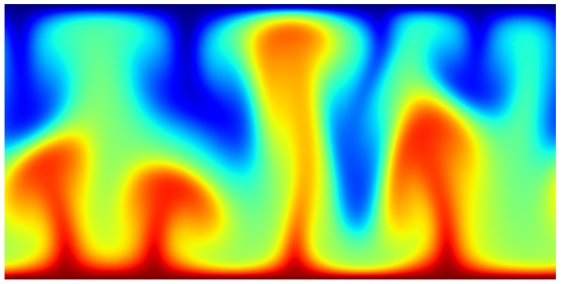
Content: The behaviour of fluids can be described by systems of partial differential equations. Since the analytical solution of these systems is in general not known, numerical approximation schemes are applied. In contrast to traditional computational fluid dynamics (CFD) approaches based on the conservation of macroscopic quantities like mass, momentum, and energy, the LBM models the fluid by the kinetics of discrete particles that propagate (streaming step) and collide (relaxation step) on a discrete lattice mesh. Due to its particular nature, LBM has several advantages, such as dealing with complex boundaries, incorporating microscopic interactions, and parallelization of the algorithm. Within this lecture we will study the Lattice Boltzmann method, in particular the derivation of the scheme and its mathematical analysis as well as recent advances such as for example the Cumulant-based LBM. Moreover, we plan to illustrate the numerical algorithms and current state of the art software and apply them to selected model problems from science and engineering (e.g. external forces acting on the fluid, porous medium applications, heat- or contaminant transport or simple blood-flow models). However, no preknowledge in these fields of application is necessary.
Learning goal: At the end of the lecture students have a profound knowledge about the lattice Boltzmann method, and are able to apply the scheme to different model problems. Further, they know the theoretical aspects and implementation and are familiar with selected applications from science and engineering.
Prerequisites: Fundamental knowledge in linear algebra and analysis (e.g. from MA0001-2 & MA0004-5), Basics in Numerics (e.g. from MA0008 OR MA3305), Programming Skills (e.g. from MA0010)
Lecture style: The module is offered as lectures with accompanying practice sessions. In the lectures, the contents will be presented in a talk with demonstrative examples, as well as through discussion with the students. The lectures should motivate the students to carry out their own analysis of the topics presented and to independently study the relevant literature. Corresponding to each lecture, practice sessions will be offered, in which exercise sheets are given and will be solved together. Solutions will be available. In this way, students can deepen their understanding of the methods and concepts taught in the lectures and independently check their progress. Within additional and dedicated programming sessions we will work on the implementation of case studies from science and engineering in order to see the LBM algorithms in action in combination with possible applications.
Literature:
- T. Krüger, et al., The lattice Boltzmann method, Springer, 2017
- S. Succi, The Lattice Boltzmann Equation for Fluid Dynamics and Beyond, Oxford University Press, 2001
- D. Hänel: Molekulare Gasdynamik. Einführung in die kinetische Theorie der Gase und Lattice-Boltzmann-Methoden, 2006
- D. Wolf-Gladrow, Lattice-Gas Cellular Automata and Lattice Boltzmann Models, Springer, 2000
Examination: The module examination is based on a written exam (90 minutes). Therein the achievement of the competencies given in section "learning outcome" is tested exemplarily.
- Dozent: Markus Muhr
- Dozent: Barbara Wohlmuth
